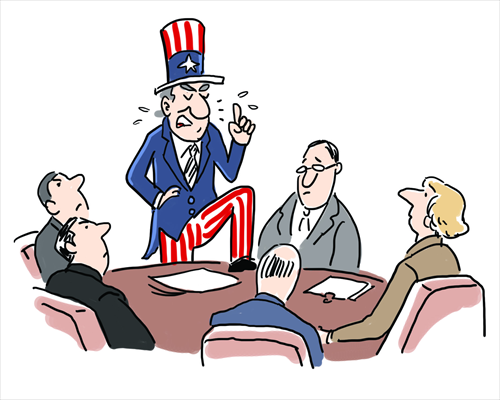Cold War posturing does little for US at G20

Illustration: Liu Rui/GT
Despite Australia's attempt to keep the recent G20 summit in Brisbane focused on the global economy, the US chose to grandstand against Russia. The US gave the impression of faltering world leadership and so must change its ways.
President Barack Obama's performance in Brisbane was more show than substance just as at the preceding APEC and ASEAN conferences. Cold War rhetoric and aimless megaphone diplomacy seem to characterize what Washington believes to be world "leadership." But is anyone listening?
The international community is increasingly skeptical of Washington. Its obsession with regime-change wars and color revolutions, its crusade to make the neoliberal "Washington Consensus" global and permanent, and its use of NATO as a global gendarme, alienate important sectors of world opinion.
US clout seems to be fading, some critics say. Washington must come up with constructive and innovative diplomacy for the changing world and it must convincingly demonstrate a revitalized national economy to counter perceptions of decline.
Reviving the Cold War is a dead end. In recent weeks, prominent world personalities and leaders warned against Washington's neoconservative-driven new Cold War against Russia.
Former Soviet president Mikhail Gorbachev and former German foreign minister Hans-Dietrich Genscher forcefully expressed their concerns. Pope Francis also expressed his deep worries.
In the US, former US secretary of state Henry Kissinger criticized the Obama administration's Russia policy and rebuked its Ukraine policy. He called such irresponsible policies a mistake and indicated that they could lead to another Cold War.
Unfortunately, such warnings fall on deaf ears in Washington. Critics say that "endless wars" are on top of Washington's agenda. Rather than questioning reckless policy, the mainstream US media promotes it.
Today, both political parties support interventionist and militarized foreign policy. There are a few lone voices in each party in opposition, but so far they lack legislative impact.
Many ask how the US can be a credible global leader given what some believe to be its relative economic decline. So what can the US show on the economic front?
Not much at the moment. Questions are raised by its failure to revive and strengthen the economy, by its failure to address financial stability through separation of commercial and investment banks, and by its failure to rebuild and modernize disintegrating infrastructure.
One startling symbol of today's US economy is that an estimated 2.5 million children are homeless. According to a report released this month by the National Center on Family Homelessness, this represents one in every 30 children in the US and the numbers are rising.
The White House and Congress have no problem spending trillions of dollars on endless wars, but the American people face deteriorating socioeconomic conditions.
Creative and effective diplomacy seems beyond current US capability. Coercion and endless wars substitute for serious diplomacy in support of global peace and development.
The US Department of State in recent years is increasingly politicized and ideological, with top positions filled by political appointees rather than by experienced career professionals. Many such political appointees cycle in and out of Washington's revolving door from think tanks, law firms and investment banks. They serve special interests rather than the broader national interest.
US diplomacy at the G20 summit was disruptive. Rather than focus on global economic development as the top priority, the US engaged in counterproductive Cold War rhetoric and posturing.
The meeting of the BRICS group on the sidelines of the summit, the presentation of China's positive world vision for peace and development by Chinese President Xi Jinping, and the substantial progress in bilateral Australia-China relations appeared to not a few as the significant results of the G20 summit.
Come January 2015 in Washington, the White House and the new Congress must begin to work together to create an effective and relevant foreign policy. A positive new vision and a positive new direction are long overdue.
The author is an educator and former senior professional staff member of the Senate Committee on Foreign Relations. opinion@globaltimes.com.cn